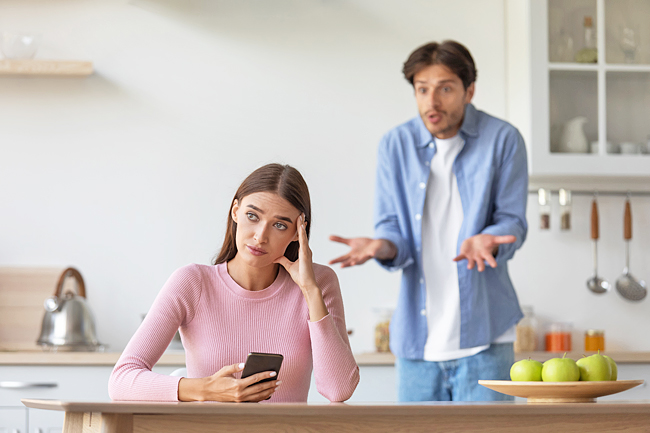CNA – If you’ve ever been in a romantic relationship, you’ve probably experienced the frustrating moment when you realise that while you were talking about something, your partner was engrossed in their phone.
Considered a relationship breach, “phubbing” – a blend of “phone” and “snubbing” – seems harmless at first glance. However, mounting research reveals its potential harm.
Recent findings linked frequent phubbing to lower marital contentment, while a 2022 study identified its ability to generate feelings of distrust and exclusion. Another study revealed a reciprocal pattern, where heavy phubbers tend to receive the same treatment in return, resulting in a ripple effect.
“Phubbing can be a range of different behaviours, from glancing at your phone in the middle of a conversation, to checking your phone when the conversation stalls out a little bit, or keeping your phone close by,” said board certified couple and family psychologist and the Chief Academic Officer at the Family Institute at Northwestern University Anthony Chambers.
He said the issue comes up among the couples he works with on an almost weekly basis.
“It is a funny word, but it really can have an impact,” Dr Chambers added. Fortunately for most couples, it’s a relatively easy issue to fix, he said. These strategies can help.

1. ESTABLISH CLEAR GROUND RULES
To the extent it is possible, couples should be aligned about how they define phubbing, and what they are willing to put up with, Dr Chambers said.
But Professor in the Couple and Family Therapy programme at the Kirk Kerkorian School of Medicine at the University of Nevada, Las Vegas Katherine Hertlein, whose research has focused on the effect of technology on couples and families, said she’s often surprised by how few couples – even those who may have met online – have clear phone or technology rules in place.
A few starter questions she encourages couples to consider: What are the rules around when we talk to others? When is the phone present? When do we put it away?
“I know people don’t want to do this in their relationships, but truly it’s the number one strategy,” Dr Hertlein said.
Dr Chambers has had success in helping couples establish phone-free zones, whether that’s a particular room in the home where phones are off-limits, or a stretch of time when devices need to be put away.
Partners should set the boundary together: No phones in the bedroom? No phones at meal time? (Research has found that when people keep their phones on the table, they tend to feel more distracted and less socially engaged.)
It may help to establish lighthearted consequences for breaking the rules, Dr Chambers said: Perhaps a partner who whips out a phone at dinner needs to pay for the meal or do the dishes after.
He also encourages couples to take control of their pop-up notifications. “That can be a really big trigger,” he said. “You hear the beep or the buzz, and you’re sort of trained to pick up the phone and say, Oh, what’s this? What’s going on here?”
2. IF YOU’RE UPSET ABOUT PHUBBING, TALK ABOUT IT
Obvious? Yes. But Dr Chambers frequently works with couples where phubbing behaviours have been left to simmer until they become a bigger problem.
One partner may feel like the other is spending time on their phone in lieu of helping out with the kids or household tasks, or that they find work e-mails or the news more interesting than family time.
He has worked with many clients who have admitted they had no idea how much distress their behaviours were causing until they were in a therapy session.
“As soon as you’re starting to identify those feelings of being hurt or frustrated or being snubbed, those are the times when you need to let your partner know,” he said.
3. NARRATE WHAT YOU’RE DOING
A partner may be upset by phubbing because it’s simply bad manners. But in the context of a romantic relationship, there can be added layers of hurt, particularly if one partner feels like he or she is having to compete for the other’s attention, Dr Hertlein said.
“The important thing to remember here is that it’s often what your partner perceives is happening that is creating the anxiety and creating the issue,” she said. “For instance: I perceive that you are engaging with other people to the exclusion of me.” Dr Hertlein noted that people tend to put their phones face down and then only pick them up for a moment or two, which can feel unintentionally secretive.
For that reason, it may help to narrate what you’re doing when you are using your phone in front of your partner, Dr Hertlein said. If you are depositing a mobile cheque or replying to a work e-mail, let your partner know. Communication is the key to getting past phubbing, Dr Chambers emphasised.
“I can’t stress enough the importance of letting your partner know how you feel,” he said.
“Once you have understanding and clarity, you can really start to see the boost in relationship satisfaction.”










